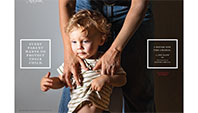 |
1. Jen Gann documented her heartbreak at learning that her son, Dudley, has cystic fibrosis — and at the painful realization that to win a “wrongful birth” lawsuit to help pay for his medical care, she would have to argue that he should never have been born (“Every Parent Wants to Protect Their Child. I Never Got the Chance,” November 27–December 10). @Alirosa tweeted, “I haven’t found a more honest account of motherhood or disease,” and Deadspin’s Lindsey Adler described it as a “masterpiece of compassion and conviction.” The story elicited an outpouring of responses from members of the CF community. Rebecca Mueller of Philadelphia wrote, “As a 36-year-old with cystic fibrosis who also happens to be a genetic counselor by training, I am deeply sorry that Gann and her husband were robbed of reproductive choice. I am also sorry that the article offered such a bleak view of Dudley’s future. CF is bad. But my life has not been overwhelmingly full of suffering. And the suffering I have experienced has transformed me into an unshakable optimist who sees the glass as one-eighth full, which makes life profoundly enjoyable.” Reid Jewett Smith wrote, “My parents, who received my diagnosis in the 1980s, had every reason to victimize themselves the way you are now. But they didn’t. They faced heartbreaking decisions, like whether to have additional children to replace my inevitable loss, but they never compared my care to a ‘life sentence’ or looked at me and thought they ‘made a particularly brutal death.’ Reframe the way you approach your son; treat his life with dignity, and prop him up with high expectations. Embrace drugs like Kalydeco, and feel grateful for 21st-century medical innovations. Empower Dudley to see his disease as a source of strength, grit, resilience, and achievement. Finally, instead of dismissing the adults whose plight you once had the luxury of knowing ‘nothing about,’ look at the myriad examples of extraordinary adults with CF. Two of my closest friends also have CF and went to elite colleges. One is a Harvard Law graduate. I’m getting my Ph.D. But more important, we are all now mothers with exceptional partners and families. You have the chance to protect Dudley. Protect him from your (perfectly reasonable) grief. Protect him from low expectations and pity. Protect him from seeing his disease as a ‘life sentence.’ ” Abigail Dwyer of New York added: “Health outcomes for persons with CF vary wildly. I cannot predict what path the author’s son’s disease will take. I do know that I love my life — both despite my CF and in part because of the gifts it has given me. My life is beautiful and hopeful and complicated and imperfect. Just like the author’s son’s life will be.” In response to these readers and others, Gann writes: “Women consider abortion for all kinds of very personal reasons; cystic fibrosis would have been mine. But being denied this decision doesn’t mean I’m without hope or excitement for my son’s future, whatever that may look like. While I’m not looking forward to telling him CF doesn’t go away, or that other kids don’t have to do treatments while they watch cartoons, I can’t wait to see what interests him, what he dislikes, what he wants to talk about, once he can say more than ‘Mama, more birds, please.’ Wrongful birth is a legal pathway toward paying for some of his health care. I’m doing it because I love my son desperately, just like every other mother who’s had or considered an abortion, for any reason.”
 |
2. In his column, Will Leitch offered a prognosis for football’s future (“Is Football Over?,” November 27–December 10). Adam Radwanski from the Globe and Mail tweeted, “This is a very good analysis … I’d just add one thing I find tends to get overlooked in stories on NFL’s decline: games have become borderline unwatchable because of their pacing.” And Steve Almond, author of Against Football: One Fan’s Reluctant Manifesto, responded: “It’s a catchy headline, but for the NFL to truly die out would require average fans to see themselves as complicit in the sport’s obvious corruptions: its brain-damaging violence, its lionizing of manly aggression, its promotion of insidious racial stereotypes and militarism, its well-oiled funneling of taxpayer dough to billionaire owners, and its happy conversion of jock worship into nihilistic greed. The job of our Fourth Estate should be to treat the NFL as something more than a thrilling spectacle: a huge business whose undeniable pleasures come at a cost to the national soul.” Other experts also had trouble imagining that the end is nigh: Diane Roberts, author of Tribal: College Football and the Secret Heart of America, wrote, “Despite the 5.7 percent drop in TV ratings, despite those ridiculous Thursday-night games, despite conservatives burning their Cam Newton jerseys, the NFL won’t go until the college game becomes unsustainable, and the college game will continue as long as America’s daddies think that playing in a Pop Warner league will turn that sissy boy into a man. We know that repeated sub-concussive hits can cause degenerative brain disease, but damn! We love a spine-rearranging tackle. We also know that a 21-year-old college baller with a shot at making millions in the pros can be aware there’s a chance he’ll be a drooling wreck by age 40 but will still roll the dice.”